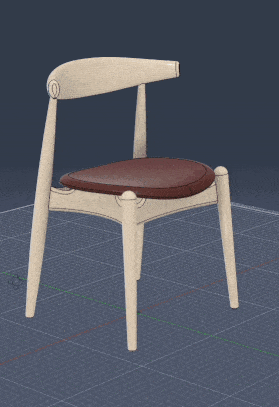DIGITAL CRAFT CLASSES
I offer classes in 3D Modeling, CNC machining and other digital processes. All my classes are geared towards artists, craftspeople and creative manufacturers. Whether you are an established maker, student or hobbyist, these classes will help you learn digital processes through a craft-centered lens, with a focus on practical applications and integration with traditional processes.
WINTER AND SPRING COURSES (2025-2026)
Fusion360 for Artists and Craftspeople
January 8 to February 12, 2026 (Weekly on Thursdays)
Online Course
An in-depth introduction to the capabilities of Autodesk’s Fusion360 software, geared specifically for artists, craftspeople and creative manufacturers.
Chair modeled in Fusion360
Next Steps in Digital Craft
March and April 2026 (Exact date TBD)
Online Course
An intermediate level course for makers that want increase their skills in 3D modeling and digital manufacturing. This course includes personalized content and 1-on-1 sessions.
CAM and CNC Clinic (Fusion360)
Unscheduled — Please email to be contacted when this course runs again.
Online Course
An intensive course in using the CAM environment of Fusion360 to create toolpath files for shaping wood on a CNC router, along with many tips and best practices for getting good results from your CNC router.
MORE INFO:
My philosophy towards digital processes:
I believe that digital processes hold tremendous potential for augmenting, improving, and even transforming the creative pursuits of artists and craftspeople, especially when they are used judiciously and with consideration for the impact they can have on aesthetics, work-flow, and quality of time in the studio. I’m particularly interested in helping makers holistically integrate digital processes into broad and complex studio practices that also include manual and traditional processes. There are many uses for digital tools and CAD software, including automated manufacturing, extreme precision, endless design potentialities, powerful concept visualization, and much more. Access to these technologies can bring meaningful benefits to one’s process and business, from more income, to less physical stress, to the ability to create things that are unachievable by traditional means. However, digital processes can be difficult to fit into an established creative practice, especially for those of us who don’t wish to spend our days at a computer. My goal as a teacher and consultant is to help artists and craftspeople gain access to these benefits without corrupting the aesthetic or experiential nature of their work, and to explore how the field of digital manufacturing can grow in the hands of makers with deep skill, attention, and material knowledge. Click here for more info about me.
What if you don’t have any digital manufacturing tools?
Even if you don't have (or want to use) a CNC router, 3D printer, laser-cutter or other digital fabrication equipment, there are many ways that 3D modeling software can be still be useful in your studio practice. Here are some examples:
Having an alternative approach to design that is more fluid than linear processes like sketching or physical model-making.
Deriving measurements that would be hard or impossible to calculate normally.
Understanding complicated design relationships without making a physical sample or full-scale drawing.
Precisely calculating the weight and volume of materials (extremely useful for mold-making/casting purposes)
Creating realistic renderings to visualize your work or show to clients.
Producing technical drawings.
Creating files that can be outsourced to a laser, water-jet or CNC vendor.



